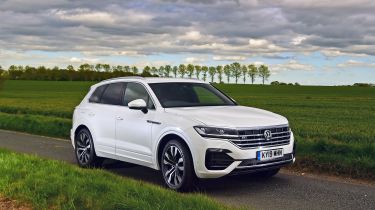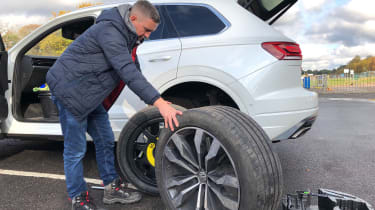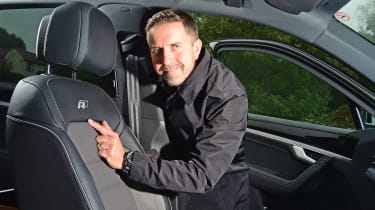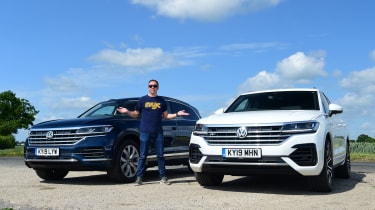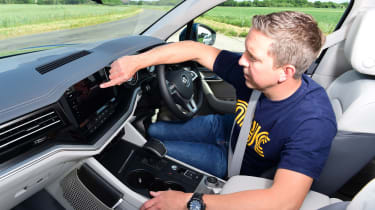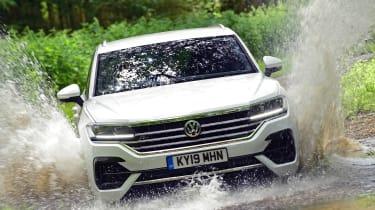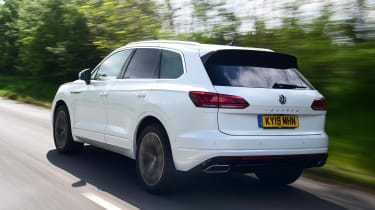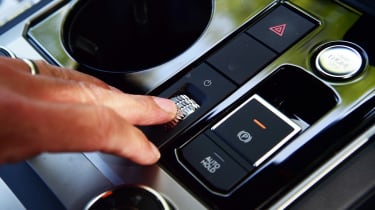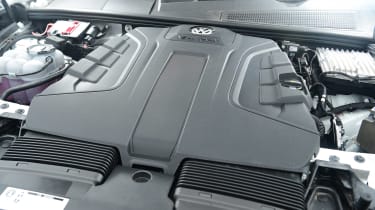Volkswagen Touareg R-Line: long-term test review
Final report: VW’s V6 diesel has been a highlight of our time with big SUV

We'll miss the Touareg’s supple ride, comfy seats, top-notch infotainment and spacious interior. It’s big and expensive, but proved to be perfect for driving up and down the country on a daily basis.
Mileage: 17,286Economy: 35.8mpg
It's time to say goodbye to my Volkswagen Touareg, which means that I need to think about which aspects of this large SUV have left the biggest impression on me over the past six months.
It’s been all round the country – from Mersea Island in Essex to walk the dog, to Frinton-on-Sea with the family, plenty of airport parking and to tests all over the UK.
I didn’t have to think about its best point for long, because the engine in this car is a work of art; it’s the 3.0-litre V6 under the bonnet that I think I’ll miss most about my Touareg when it goes back to VW.
The diesel engine in our car has 228bhp, which is the lower of two power outputs you can have with this configuration. Yet it’s more than powerful enough; I seriously can’t think why you would want or need more performance than this engine has.
Used - available now

2023 Volkswagen
Touareg
8,500 milesAutomaticDiesel3.0L
Cash £52,138
2023 Volkswagen
Touareg
37,223 milesAutomaticDiesel3.0L
Cash £42,590
2023 Volkswagen
Touareg
30,318 milesAutomaticDiesel3.0L
Cash £40,087
2023 Volkswagen
Touareg
52,720 milesAutomaticPetrol3.0L
Cash £35,495There’s 500Nm of torque at just 1,750rpm, so the motor always felt muscular and punchy regardless of which gear I was in. It meant overtakes on country roads were smooth and easy, and getting up to speed on motorways was no trouble at all. I loved driving around in the VW for this reason, feeling the constant wave of torque and power under my right foot at all times.
But like the Mona Lisa or Starry Night, I can’t help but feel this V6 motor is a product of a different time. As progress demands increasingly efficient powertrains, including EVs, hybrids and even more radical tech like hydrogen fuel cells, the diesel engine is being left behind. It’s a shame because ofthe benefits it brings: this effortless power found in the Touareg is possible even when getting more than 35mpg.
I do hundreds of miles every day in my job photographing cars for Auto Express, and once I’ve arrived at my destination the Touareg is often in use as a camera car. It’s been perfect for that, and it’s not just because of the engine under the bonnet. The huge boot, which has a large tailgate opening, means I was able to hop in and out easily, and move about inside to get the angle I wanted for each photo. The smooth ride also helped keep my camera steady.
That last point is another aspect of the Touareg that has left a lasting impression on me. My car was fitted with the Professional Chassis Pack, which adds air suspension with a self-levelling function, off-road modes and rear-wheel steering, plus some very clever electromechanical anti-roll bars. I’ve written about this tech highlight in previous reports, but it’s worth reiterating why it’s so good.
The air suspension constantly adjusts to the road surface, even on rough terrain, and while I’ve not done much off-roading in the big VW, it really transforms it into a super-smooth car to drive on British tarmac. I’ve loved using it, and the engineering under the Touareg’s skin is interestingand genuinely makes the SUV better.
Some of the technology wasn’t as good, though. I never really got to grips with lane- assist, and the autonomous emergency braking was over-sensitive. I found that when it detects objects around bends, like parked cars, it tends to overreact.
It also has a thirst for AdBlue. I’ve filled it up four times in six months, because it needs a top-up every 3,000 miles or so. It’s not too difficult, but at about £15 a time from petrol stations, it’s an additional expense that I hadn’t initially considered.
Also the tyres have needed inflating a couple of times as the weather has got colder. They should run at around 2.5 bar, but have seemed to drop to 2.3 bar as the temperature falls. After a few miles they usually got back up to pressure, though.
A left-rear puncture on the M25 led to a tyre change for the supplied space saver, which wasn’t too hard to fit, aside from hauling the massive 21-inch alloy into the boot. But it threw the safety systems off, and I had error messages until the normal wheel went back on. The space saver did the job, though, and got me to a garage where we found a piece of metal that had deflated the tyre.
The Touareg even brought out the artist in me, because I was always stopping to take snaps of it when the light was good. I’ll really miss this big VW.
Second report: Volkswagen Touareg
How does the petrol VW Touareg compare with our diesel car?
Mileage: 7,691Economy: 46.3mpg
I’m loving life with my big Volkswagen Touareg SUV for all sorts of reasons.
But a chance encounter with a different variant of the car got me thinking about which version of the Touareg I would choose if I were to buy one myself, and which options are most important to me.
My car has a 228bhp V6 diesel engine and it’s in R-Line trim, which is a mid-range specification. The other car I found myself in, briefly, was a newer 3.0-litre petrol Touareg with 335bhp, but it was in a lower, SE L, spec – and it costs £52,675, just £40 more than my diesel version.
An initial look at some numbers suggests that the petrol version probably wouldn’t work for me. It sits in the same 37 per cent company car tax bracket as my diesel model, so there’s no saving to be made there, and while I didn’t have enough time to tell what its real-world economy would be, the WLTP figure of 25.9mpg is way off my Touareg’s official 34.4mpg. I’m actually getting 46.3mpg without even trying – I don’t purposely drive more slowly to maximise fuel economy – so it’s hard to imagine the petrol car saving me any money.
So why might you want one? Probably because it has over 100bhp more than my car, which is a big chunk of extra power. Yet I still can’t see myself needing any more grunt than my car already has. That might be because the V6 TDI has 500Nm of torque at just 1,750rpm, so it has loads of shove even at low revs. The petrol Touareg might have more power, but it has a bit less torque, at 450Nm (although it’s produced slightly lower in the rev range, at 1,340rpm).
My car is claimed to go from 0-62mph in just 7.5 seconds, which is more than fast enough for me – especially considering the excellent fuel economy for a massive SUV. I’d stick with diesel power, then.
Another thing that the encounter with my TDI’s sibling made clear is that the Touareg’s Innovision Cockpit is a core reason why I love the car’s interior so much. You see, this other model was fitted with the basic set-up, called Discover Navigation Pro.
• Best used 4x4s and mid-size SUVs
This uses a decent 9.2-inch touchscreen (right), which would be huge in any other model. Yet the Innovision Cockpit in my car (a £3,560 option) brings a 15-inch screen and a 12-inch digital instrument cluster that replaces the traditional dials. Together, they give the whole cabin a completely different look and feel. It’s way more upmarket and hi-tech, so I would go so far as to say that it’s a pricey but must-have option.
The two screens stretch across the dash and are customisable and easy to operate, with a responsive interface and clear menu buttons. The sat-nav is really easy to work as well. I’ve loved using it, so I really would want this option if I were buying, despite it coming with a fairly hefty price tag.
There are a few other extras that I’d be keen on, too, including my car’s plush leather seats (£1,790). Like the Innovision Cockpit, these really lift the interior and make the Touareg stand out; luxury appeal is one of the main reasons why large SUVs are so popular, and the seats are key to that. The 20-inch alloys and black accents on the R-Line car’s exterior look great too, although I wouldn’t call them a must-have. Perhaps the best compromise is to go for an SE L car, but with these key options added.
• Most economical SUVs and crossovers 2019
However, R-Line does come with four USB sockets as standard, which has been really handy for me – my two daughters are always needing to charge their devices in the car, so the extra ports are helpful. Plus, there’s four-zone climate control, which means that when they’re in the back they can change the settings to suit them.
So, as much as I like this petrol Touareg’s more subtle colour and styling, I’d still choose my diesel car. Its useful optional extras and powerful – but economical – engine mean it’s perfect for me.
First report: Volkswagen Touareg
The stylish new Volkswagen Touareg SUV has splashed down on the Auto Express fleet. What are our first impressions?
Mileage: 2,367Economy: 46.3mpg
This is the newest addition to our fleet, the Volkswagen Touareg – and as you can see, it’s already making a splash. Our model is fitted with air suspension, which is a fantastic extra. It means the car can lower itself for better aerodynamics on the motorway, boosting economy, or raise the body for more ground clearance.
This function is perfect for taking on fords, which has already come in very handy. Recently, on the way to pick up my kids from a camping trip, I found my route blocked by water – yet the Touareg’s raised ride height made fording the flood easy, and I arrived in good time to collect them.
Our car also includes a self-levelling function, off-road modes and rear-wheel steering, which has been really useful for parking. This Touareg doesn’t only have air suspension, though – it features the Professional Chassis Pack (£4,890), which includes all of the above as well as an innovative set-up that incorporates electromechanical anti-roll bars. These work to eliminate body roll and improve stability on rough, uneven road surfaces. We’ll learn more about the system once we have spent more time in the car, but the Touareg’s agility with this set-up included is quite remarkable. It’s much more tied down than I expected considering its huge size.
Our new VW has so much technology on board that I’m having trouble taking it all in. I reckon it’ll be several months before I get used to everything. A huge 15-inch touchscreen is fitted on the dashboard, blending into a digital instrument cluster behind the steering wheel.
It’s called the Innovision Cockpit, and it hasn’t failed to impress anyone who gets in the car so far. The huge screen is a sign of things to come in the automotive world, because buyers are getting used to ever-larger digital displays in all areas of their lives. However, the VW’s is one of the biggest I’ve come across. It makes seeing where I’m going on the sat-nav easy, although I can also display that on the digital dashboard.
The rest of the cabin is great, too, with comfortable seats and plenty of good-quality materials, so I have no complaints about spending time behind the wheel.
The engine is another highlight, because it’s a real powerhouse. With 228bhp, ours is the least powerful motor available in the Touareg range, yet I can’t see why you would want more. It has 500Nm of torque, which is more than enough for me; I can overtake pretty much anything I want with a small squeeze of the throttle. It doesn’t need to be revved hard to add speed, because all that torque is produced low in the rev range. This means it stays nice and quiet, too.
When I first saw the Touareg in the company car park, I did worry that it might be too big for me. However, this model is so easy to drive that I’ve forgotten all about my concerns – and that’s partly thanks to the rear-wheel steering, which reduces the turning circle at low speed.
Also, all the various cameras and sensors work really well, and I haven’t felt uncomfortable parking the big SUV at all. A testament to technology is that it can turn one of the biggest cars I’ve ever run into something that’s as easy to park as a family saloon. The car’s hi-tech nature also means that it resists body roll much more than other SUVs of this size that I’ve tried.
Of course, such a huge car means there’s loads of boot space as well: a gigantic 810 litres with the seats in place. This isn’t a seven-seater model, so there’s extra room in the luggage area compared with rivals such as the Audi Q7. It’s a bit odd that VW doesn’t offer a version of the Touareg with seven seats, but I have no need for the extra people capacity so this doesn’t bother me.
In fact, the huge boot meant that when I went to collect my kids from camping, I had no trouble fitting all of their gear in the back. And now that the VW has started work as my photographer’s transport, I’ve discovered it eats up all of my camera and car-cleaning gear without any trouble at all. I love spending my working week travelling in comfort, too – so the next six months with the Touareg should be great.
* Insurance quote from AA (0800 107 0680) for a 42-year-old in Banbury, Oxon, with three points.

